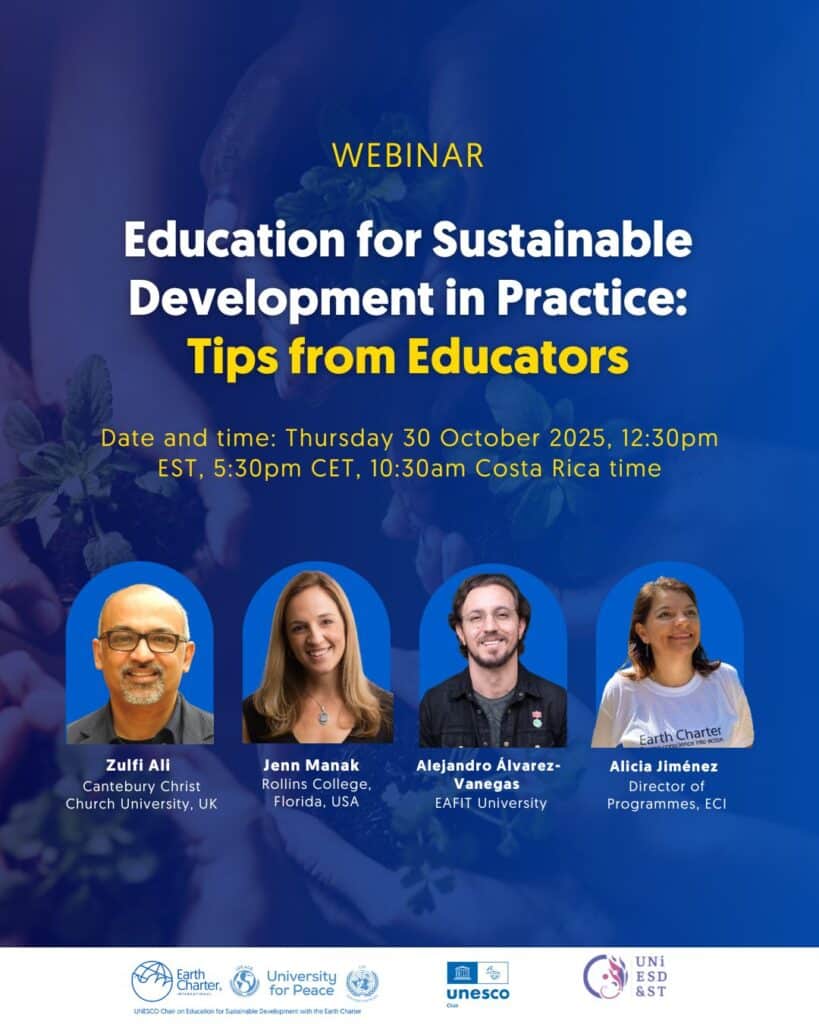Earth Charter International and the UNITWIN Network on ESD and Social Transformation, are organizing a series of webinars to bring together educators from different contexts to share good practices on education for sustainable development.
The objective is to open a space for sharing and learning about how education for sustainability can be put into practice and get inspiration from concrete actions, from primary and secondary to higher education, in formal or non formal settings and from different cultural contexts.
The theme of this webinar is “Embedding sustainability in university courses”, the idea is to learn from concrete examples about how university professors have been able to integrate pedagogy and content or themes associated with sustainability in their courses, which challenges they have faced and strategies to overcome those challenges. We’ll also learn about a project that involves 10 universities in Latin America and 3 universities in Europe that are generating capacity building processes to help academics of those institutions to work with the SDGs in their teaching.
This webinar is organized as part of our UNESCO Chair on Education for Sustainable Development with the Earth Charter, which develops education programmes and research in the field of education, sustainability, as well as values and ethics.
WHEN
Thursday 30 October 2025, 10:30am Costa Rica time | 12:30pm EST | 5:30pm CET

SPEAKERS:
Zulfi Ali (UK, Pakistan). Senior Lecturer. School of Social Work, Education and Teacher Education, Cantebury Christ Church University, UK. Zulfi has a background in international development, with over two decades of field experience in South Asia. His interests lie in postcolonial educational histories, as well as education for social and environmental justice, and peace education. His teaching and research at CCCU relate to these areas of interest. Prior to moving to the UK, Zulfi was Director at the Children’s Museum for Peace and Human Rights in Karachi, Pakistan. This project aimed at delivering socially relevant education through a proactive, inclusive and innovative institutional model.
Jenn Manak (USA) received a PhD in Education/Curriculum and Instruction focused on Language, Literacy, and Culture from the University of Florida. She was a public elementary school teacher for seven years before entering higher education. She is a professor in the Education Department at Rollins College in Winter Park, Florida, USA. She teaches courses infused with strategies to support culturally and linguistically diverse students and students with learning needs. Her research interests include transdisciplinary education, culturally responsive and inclusive pedagogies, and education for sustainable development.
Alejandro Álvarez-Vanegas (Colombia). Professor at EAFIT University in the Natural Systems and Sustainability Area. He holds a degree in Process Engineering from EAFIT University, a Master’s degree in Sustainability Sciences from Leuphana University in Lüneburg, and a PhD in Higher Education for Sustainable Development from Maastricht University and the United Nations University – MERIT. His research focuses on Education for Sustainable Development (ESD) and transformative and experiential learning, seeking to foster sustainability competencies in students and educators. He is also a board member of the Low Carbon City Foundation and the Otraparte Cultural Corporation.
Moderator: Alicia Jimenez (Costa Rica) Director of Programmes, Earth Charter International. Costa Rica. She is a biologist from the University of Costa Rica, with a MSc in Resource Development from Michigan State University in the United States and a PhD on Education from La Salle University, Costa Rica. In 2006, she joined the ECI, where she is involved with the Secretariat’s projects on education for sustainable development, facilitating courses, workshops, participating in research and writing projects. She has co-written two books, edited two books and written a number of articles and book chapters on ESD topics.






